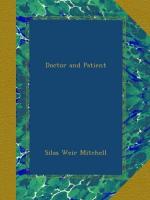The function of smell became for me a source both of annoyance and, later on, of pleasure. I smelt things no one else could, and more things than I now can. The spring came early, and once out of doors the swiftly-flitting hours of sensory acuteness brought to me on every breeze nameless odors which have no being to the common sense,—a sweet, faint confusion of scents, some slight, some too intense,—a gamut of odors. Usually I have an imperfect capacity to apprehend smells, unless they are very positive, and it was a curious lesson to learn how intense for the time a not perfect function may become. Recent researches have shown that a drug like mercaptan may be used to test the limit of olfactory appreciation. We have thus come to know that the capacity to perceive an odor is more delicate than our ability to recognize light. Probably it is an inconceivable delicacy of the sense of smell more than anything else which enables animals to find their way in the manner which seems to us so utterly mysterious. Yet, even in human beings, and not alone in a fortunate convalescence, do we see startling illustrations of the possibilities of this form of sensorial acuteness. I know of a woman who can by the smell at once tell the worn gloves of the several people with whom she is most familiar, and I also recall a clever choreic lad of fourteen who could distinguish when blindfold the handkerchiefs of his mother, his father, or himself, just after they have been washed and ironed. This test has been made over and over, to my satisfaction and surprise.




